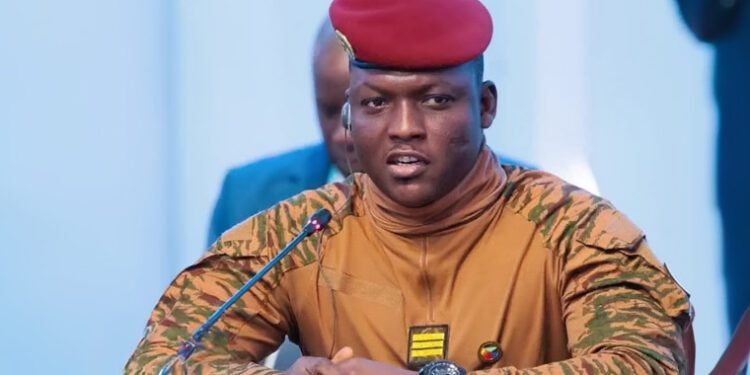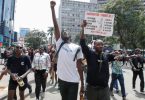By International Socialist League – ISL
Captain Ibrahim Traoré’s sudden ascent to power in Burkina Faso has sparked waves of excitement, hope and debate across Africa and the broader Global South. His rebellious image—celebrated in murals, TikToks and diasporic rallies—evokes a Pan-African, anti-imperialist spirit reminiscent of Thomas Sankara. However, many things are attributed to him that he has neither said nor done—including a widespread use of AI-generated propaganda, which attempts to portray him as ideologically and practically greater than he truly is. Yet, to millions facing imperialist plunder, extreme economic crisis and state collapse in Africa, South Asia and Latin America—regions still suffering under the weight of draconian colonial past—Traoré appears as a beacon of revolutionary hope.
From a Marxist perspective, appearance must be tested against essence, and form must be assessed through its content. While we recognize the revolutionary social process behind Traoré’s rise and acknowledge the relatively radical measures taken under his rule, we must sound a critical alarm. The absence of Marxist leadership in the form of a revolutionary party, the lack of working-class power and democratic organizations, and the increasing militarization of political life all carry the seeds of authoritarian degeneration. The developments in Burkina Faso broadly echo both the strengths and typical weaknesses of similar post–World War II upheavals in the Global South—processes that often culminated in the rise and ultimate fall or degeneration of similar regimes.
However, with the collapse of Stalinism in the Soviet Union and Eastern Europe, the further degeneration of Chinese Stalinism into a Stalinist-state capitalist regime, and the unprecedented global crisis of capitalism, the viability of such regimes has drastically diminished. Consequently, their historical lifespan has become markedly shorter. Worse still, Traoré’s turn toward rising imperialist powers in the East—Russia and China—and his emergence as a ‘strongman’ figure with unchecked authority further risks turning a popular mass revolt into degeneration and retrogression.
This resolution is a preliminary attempt to evaluate Traoré’s record, challenge Western imperialist attacks (especially by AFRICOM), and argue that only a socialist revolution—led by the proletariat in alliance with other exploited layers—can liberate Burkina Faso, Africa and the world from imperialist-capitalist tyranny.
Genuine Gains Under the Traoré Regime
There is no doubt that Traoré’s military-led transition has brought tangible benefits to the Burkinabè people. In just over a year, his government has:
- Partially reclaimed national wealth: The establishment of a domestic gold refinery and the renegotiation of mining contracts have increased state control over natural resources. Revenues previously looted entirely by multinational corporations are now partially redirected toward national development.
- Revitalized agriculture: The state has distributed fertilizers, modern equipment and improved seeds free of charge, strengthening food security and expanding local processing for cotton, maize and tomatoes.
- Launched social infrastructure: Over 1000 displaced families have been resettled affordably. New schools and clinics are being built. Electrification and water projects in rural areas counter decades of neglect.
- Challenged neocolonialism: The expulsion of French troops, termination of security agreements and the widespread slogan “France Must Fall!” reflect growing anti-imperialist consciousness.
These are not minor achievements. They reflect measures that attempt to serve the people—though not under their direct democratic control—amidst impossible contradictions: national ruin, IMF sabotage, climate crisis and insurgency.
The Cult of the Captain
While Traoré’s popularity is understandable, it is becoming increasingly problematic. His image—often photoshopped beside Che Guevara and Sankara—is not merely a symbol of resistance. It is fast becoming a personality cult, substituting itself for political organization.
Marxists know that the emancipation of the working masses cannot rest on any individual or layer in the society, no matter how radical or well-meaning. Figures rising as saviors and trying to fill the organizational or political vacuum left by a social class is a hallmark of Bonapartism, whose character is determined by its class foundation and class interests which it serves. Nevertheless, even left-wing Bonapartisms tend to balance between classes, suppress the independent initiative of the working class and govern from above, while claiming to act in the people’s name.
Moreover, even the “favors” granted to workers and peasants often come at a cost—perks, privileges and at times outright corruption and plunder by the bureaucratic elite in power. The task of Marxists is not to blindly celebrate movements or be swept up by them. We support the gains, point out what is lacking, criticize what is reactionary, and highlight internal contradictions to help sharpen the revolutionary edge.
In this regard, without democratic organs of workers’, peasants’ and soldiers’ power, Traoré’s regime remains top-down and militarized. Dissent is silenced. Journalists have been arrested. Protesters have disappeared. These are serious warning signs.
The Venezuelan experience in the recent past is instructive. Hugo Chávez was celebrated worldwide for defying imperialism, nationalizing oil and initiating social programs. But his regime never abolished capitalism and lacked the democratic control of organized workers. Over time, particularly after Chávez’s death, power became increasingly centralized. Dissent was suppressed, unions were weakened and partnerships were formed with Chinese and Russian capital. The current regime in Venezuela is a shadow of the hopes sparked by the Bolivarian Revolution. A similar danger confronts Burkina Faso—perhaps in even more acute form, given the military origins of Traoré’s power.
Eastern Imperialism Is No Alternative
Traoré’s “anti-imperialist” foreign policy is moving into dangerous territory. With France gone, Burkina Faso now turns to Russia for weapons and to China for infrastructure and investment—an approach shared by other Sahelian states.
Marxists reject the illusion that alliances with Moscow or Beijing represent liberation. These are not progressive alternatives but competing imperialist powers. Russia’s Wagner Group has committed brutal abuses in Mali and the Central African Republic, extracting minerals for profit. China’s Belt and Road Initiative is notorious for obscure conditions, exploitative loans, environmental damage and labor repression.
While a revolutionary workers’ state may sometimes be obliged to tactically utilize the confrontation of one imperialist bloc and another in its favor, such compromises must remain strictly temporary and tactical. To ideologically justify or embrace one bloc as a “lesser evil” or “relatively progress” is a political and moral betrayal.
Such tactics can only be handled correctly by a revolutionary state with a Marxist leadership and under democratic working-class control. In Burkina Faso, without such foundations, these compromises and business or investment deals risk corrupting, hollowing out and derailing the entire revolutionary process.
Liberation is not about choosing masters. It must be achieved through class struggle, mass mobilization and the construction of an international revolutionary party, aiming to put power into the hands of the working class in alliance with peasants and soldiers.
AFRICOM’s Hypocrisy Exposed
Recent statements by U.S. AFRICOM commander General Michael Langley accuse Traoré’s regime of “democratic backsliding” and claim Burkina Faso is “failing its people.”
This is nothing more than vile, fraudulent imperialist propaganda.
Where was AFRICOM when democracy was strangled by debt, French military bases and puppet regimes across Africa? Why does the U.S. support dictatorships in Egypt, Saudi Arabia, Pakistan, Rwanda and elsewhere while condemning Burkina Faso for challenging its former colonizer?
AFRICOM’s concern is not democracy but imperial control over West Africa’s resources and strategic importance. Traoré is a threat to Washington not because he is authoritarian—but because he is (so far) non-compliant.
AFRICOM must be exposed as a tool of capitalist looting, drone warfare and neocolonial management. Its criticism of Traoré is not principled but political opportunism.
Hope Without Power Is Dangerous
Traoré remains popular. His rise speaks to a genuine hunger across the Global South—for leaders who challenge the West and deliver basic needs and justice.
In Burkina Faso, this hope is grounded in real suffering and real gains.
But history warns us: Without Marxist leadership rooted in the independent organization of the masses, such movements often end in betrayal. In Chávez’s Venezuela, the revolution was ultimately disarmed by its reliance on top-down control and compromises with capital. Some decades ago in Ethiopia, we saw the crisis and eventual collapse of Mengistu’s Bonapartist regime, followed by the initial promises of Meles Zenawi, which soon gave way to neoliberalism and repression. Similar trajectories unfolded in Yemen, Angola and Mozambique—where revolutionary hopes were eventually derailed not only by foreign imperialist interventions but also by deep-seated internal contradictions and structural weaknesses.
The revolutionary process in Burkina Faso risks internal decay for the same—or similar—reasons.
The Revolutionary Socialist Path Forward
Marxists do not oppose military regimes simply because of their form, nor do they support them uncritically just because they appear progressive. We defend the gains that are won, denounce all reactionary elements and fight for the working-class seizure of power through a revolutionary party.
We advance the following demands:
- Imperialists out of Burkina Faso! No to Western imperialist intervention, sanctions or coup plotting.
- For a revolutionary constitutional assembly, elected democratically by the people and tasked with drafting a new constitution reflecting the revolutionary aspirations of the Burkinabè masses.
- Create a people’s militia by arming workers, peasants and students to defend the revolution from imperialist attack.
- Radical land reform, redistributing estates owned by local elites or foreign corporations among peasants; support for collective agriculture and green revolution through state planning and modern technology.
- Abolish class privileges and commission systems in the military. Equal pay for officers and soldiers. Officers should be elected by soldiers’ committees.
- Support for anti-imperialist measures such as the expulsion of French troops. We demand the reclamation of mines and the nationalization of key sectors of the economy—whether controlled by imperialist corporations or the local bourgeoisie. Demand for the total and unconditional cancellation/expropriation of all imperialist debt.
- Independent working-class organization, including support for unions, peasant cooperatives, student and youth movements.
- Establish workers’ and peasants’ councils—organs of class power democratically elected from the bottom up—to plan the economy and lay the foundations of a new revolutionary state built from below.
- Complete abolition of all reactionary and oppressive laws against women. End all forms of gender discrimination and oppression. Guarantee equal rights, pay and representation for working women in all sectors of society. Provide six months of fully paid maternity leave, along with comprehensive, state-funded healthcare for mothers and children. Eliminate the artificial division between domestic and industrial labor by socializing household labor and ensuring full participation of all genders in both spheres.
- Break with all imperialist blocs—East or West. Reject both NATO and BRICS. Demand the withdrawal of the Wagner Group.
- Full transparency of all international agreements. Subject trade, investment and infrastructure deals to public scrutiny. All secret agreements with imperialist powers and other states must be exposed and annulled if they undermine the interests of the working masses. Any treaties or arrangements in order to facilitate infrastructure development, industrialization or technology transfer must be made fully transparent, with all clauses published for open scrutiny, discussion and democratic control. Foreign investment and trade must be stripped of their exploitative character and transformed into tools of public welfare—subject to the democratic oversight and approval of workers, peasants and local communities through their representative organs.
- For a regional socialist federation of the Sahel and beyond, based on solidarity and joint struggle against imperialism, capitalism and climate catastrophe.
- An internationalist foreign policy, rooted in class solidarity—not nationalism or chauvinism. Link the Burkinabè struggle to a global movement for socialism.
Conclusion: Support the Revolutionary People, Not the Uniform
Traoré’s rise is not a revolution in itself—but it is a rupture. It expresses deep popular anger and revolutionary aspiration. The decaying neocolonial order is crumbling.
The question is: What comes next?
We understand why people rally behind Traoré. We too want a new, free, dignified Africa. But without working-class power, democratic self-organization and revolutionary leadership, even the most radical military regimes become traps.
The answer is not military juntas or Bonapartist illusions, but socialist revolution—across Burkina Faso, across Africa and across the world.
13 June 2025
Courtesy International Socialist League





